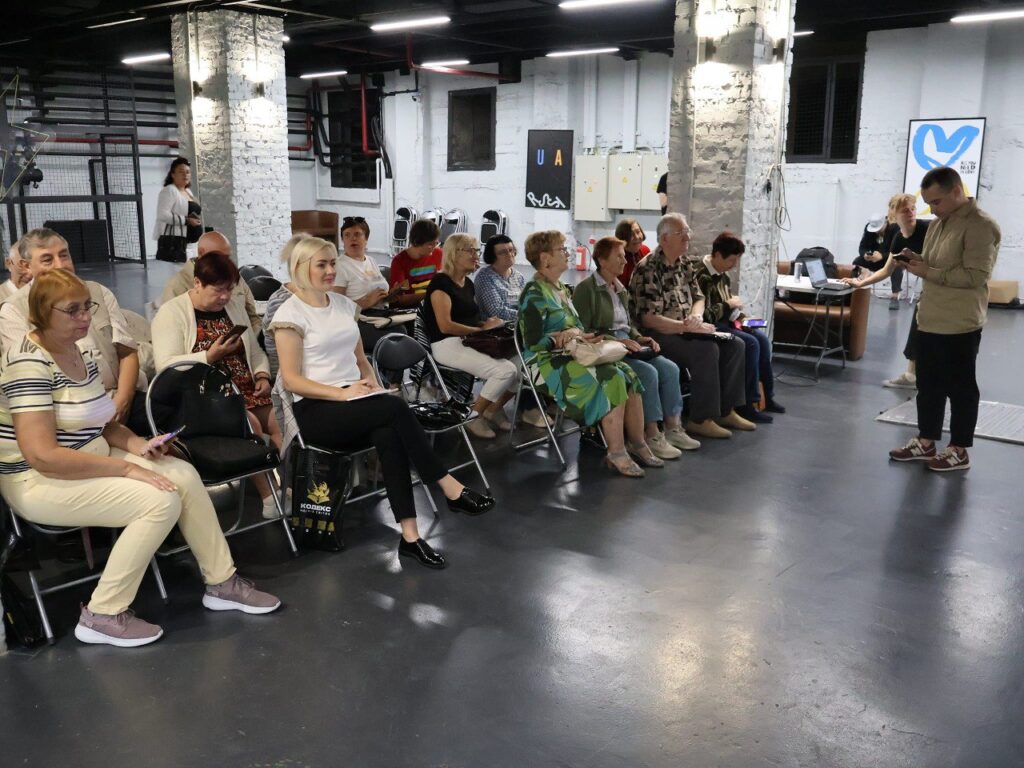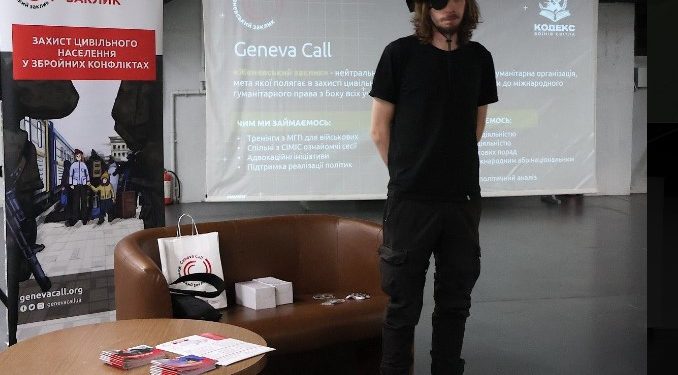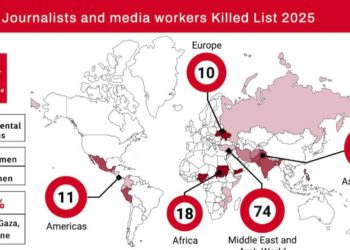It is important for journalists who cover military operations and the lives of civilians during these operations to know the principles of International Humanitarian Law (IHL). Therefore, at the initiative of the Zaporizhzhia Journalists’ Solidarity Center (JSC) of the National Union of Journalists of Ukraine (NUJU), a training for media professionals on International Humanitarian Law was held, which was conducted by the Geneva Call non-governmental organization. It was conducted by an experienced instructor in the IHL, a participant in hostilities since 2014, and lawyer Rodion Tristan. He spoke about the laws and rules of armed conflicts, the basic principles of the IHL, the legal sources of the IHL on the distinction between persons in International Armed Conflicts (those who are fighting and those who are not fighting), etc.
“So, the International Humanitarian Law is the mandatory rules that regulate the behavior of warring parties during armed conflicts. It is based on the four Geneva Conventions for the Protection of War Victims of August 12, 1949, in which almost all states of the world participate,” Rodion Tristan emphasized.
What are the main principles and foundations of the IHL? This, in particular, is the prevention of unnecessary human suffering and unnecessary destruction during armed conflicts, the protection of civilians and those who have ceased to participate in hostilities, that is, the wounded and prisoners. According to the IHL, the very fact of participation in an armed conflict for the military is not considered a crime. Responsibility arises for the commission of a crime, that is, for violating the rules of warfare.
The right to use means of defeating the enemy is not unlimited. It is prohibited to use poison or poisoned weapons, to give orders not to leave anyone alive, and to use weapons, ammunition, or materials that can cause unnecessary suffering to the enemy.

“I would especially like to emphasize the importance of observing the norms of international humanitarian law because this is a sign of a civilized society and is extremely important for the protection of the civilian population, maintaining the reputation and authority of the state and its armed forces. It is for this reason that the Geneva Call in Ukraine launched its educational project called Code of Conduct for Soldiers of Light, which is designed to convey standards of behavior for military personnel in accordance with the norms of the IHL. Our soldiers of light, almost all of them, know and adhere to the rules of warfare treatment of prisoners of war, unlike the occupiers. And we will in no case stoop to their level,” the expert emphasized.
Journalists took an active part in discussing the topic of the training, which also contributed to a deeper assimilation of the material and the fundamental norms of the IHL. Kateryna Zavarzina, the editor-in-chief of the Nashe Zhyttia newspaper from the frontline village of Novomykolayivka, shared her impressions.
“I am very glad that I became a participant in an important training on the IHL, which was conducted by representatives of Geneva Call at the initiative of the Zaporizhzhia JSC. I gained invaluable knowledge, in particular, that international humanitarian law protects persons affected by armed conflicts. The IHL establishes norms and rules for waging war in order to reduce the suffering of the civilian population, military personnel, prisoners of war, and other persons under special protection (medical, religious personnel, and humanitarian workers). For example, one of the fundamental principles of the IHL concerns the call for warring parties to distinguish between civilians and military personnel (combatants) and civilian and military objects. In particular, it is prohibited to attack civilians and civilian objects, take hostages, or use civilians as “human shields,” etc. Geneva Call actively trains fighters, informs civil society to strengthen security, and adheres to humanitarian principles. This is also very important for journalists who cover military operations and the lives of civilians during these operations,” the journalist emphasized.
NOTE. The purpose of the activities of the Geneva Call NGO is educational and training work aimed at improving the protection of combatants and civilians, familiarizing them with the rules of war, humanitarian norms, and principles.
Call the Zaporizhzhia JSC at 096 277 5352 (Nataliya Kuzmenko and Valentyna Manzhura, the Zaporizhzhia JSC coordinators). The Center is located at 152 Sobornyi Avenue.
ABOUT JSC
The Journalists’ Solidarity Centers is an initiative of the NUJU implemented with the support of the International and European Federations of Journalists and UNESCO. The initiative is designated to help media representatives working in Ukraine during the war. The Centers operate in Kyiv, Lviv, Ivano-Frankivsk, Chernivtsi, Zaporizhzhia, and Dnipro and provide journalists with organizational, technical, legal, psychological, and other types of assistance.
ABOUT UNESCO
UNESCO is the United Nations Educational, Scientific, and Cultural Organization. It contributes to peace and security by promoting international cooperation in education, sciences, culture, communication, and information. UNESCO promotes knowledge sharing and the free flow of ideas to accelerate mutual understanding. It is the coordinator of the UN Action Plan on the Safety of Journalists and the Issue of Impunity, which aims to create a free and safe environment for journalists and media workers, thus strengthening peace, democracy, and sustainable development worldwide. UNESCO is working closely with its partner organizations in Ukraine to provide support to journalists on the ground.
The designations employed and the presentation of material throughout this digest do not imply the expression of any opinion whatsoever on the part of UNESCO concerning the legal status of any country, territory, city, or area or its authorities or concerning the delimitation of its frontiers or boundaries.
The authors are responsible for the choice and the presentation of the facts contained in this digest and for the opinions expressed therein, which are not necessarily those of UNESCO and do not commit to the organization.
Valentyna Bystrova
Photo by Dariya Zyrianova

 THE NATIONAL UNION OF
JOURNALISTS OF UKRAINE
THE NATIONAL UNION OF
JOURNALISTS OF UKRAINE
















Discussion about this post